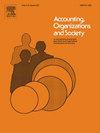Accounting, reporting and verification of impact: Implications for sustainability: A commentary on Adams et al. (2024) “Styles of verification and the pursuit of organisational repair: The case of social impact”
IF 3.6
2区 管理学
Q1 BUSINESS, FINANCE
引用次数: 0
Abstract
Accounting and the accountancy profession sit at a consequential crossroads as the realities of planetary boundaries manifest through climate change, biodiversity loss and soil depletion, forcing societies and economic systems to transform. Alongside the effects sustainability has on corporations’ financial performance, future outlook and risk profile, accounting and reporting need to focus on externalities, with the aim of shedding light on the impacts firm activities have on society and the natural environment. Drawing on Adams et al. (2023), this essay continues the discussion on sustainability, impact and verification, calling for attention to the styles of verification prioritized by current accounting infrastructures. With the interlinkages between verification, reporting and accounting, the elements and types of information we emphasize in verification have implications for corporate activities and priorities and, therefore, for their negative social and environmental impacts, which we as societies ought to reduce urgently. While challenging, the terrain of accounting, reporting and verifying of impact offers opportunities for the accounting profession and for institutions to serve the public interest by helping societies transform. This may, however, require them to transform themselves.
影响的核算、报告和核实:对可持续性的影响:对 Adams 等人(2023 年)"核查风格与组织修复的追求:社会影响案例
随着气候变化、生物多样性丧失和土壤耗竭等地球极限现实的显现,迫使社会和经济体系进行转型,会计和会计行业正处于一个重要的十字路口。除了可持续发展对企业财务业绩、未来前景和风险状况的影响之外,会计和报告还需要关注外部性,以揭示企业活动对社会和自然环境的影响。本文借鉴亚当斯等人(2023 年)的观点,继续讨论可持续性、影响和验证问题,呼吁关注当前会计基础设施优先考虑的验证方式。由于核查、报告和会计之间的相互联系,我们在核查中强调的信息要素和类型会对企业活动和优先事项产生影响,因此也会对其负面社会和环境影响产生影响,而这些影响是我们作为社会急需减少的。虽然具有挑战性,但会计、报告和影响核查领域为会计行业和机构提供了通过帮助社会转型来服务公共利益的机会。然而,这可能需要他们进行自我变革。
本文章由计算机程序翻译,如有差异,请以英文原文为准。
求助全文
约1分钟内获得全文
求助全文
来源期刊

Accounting Organizations and Society
BUSINESS, FINANCE-
CiteScore
7.80
自引率
6.40%
发文量
38
期刊介绍:
Accounting, Organizations & Society is a major international journal concerned with all aspects of the relationship between accounting and human behaviour, organizational structures and processes, and the changing social and political environment of the enterprise.
 求助内容:
求助内容: 应助结果提醒方式:
应助结果提醒方式:


